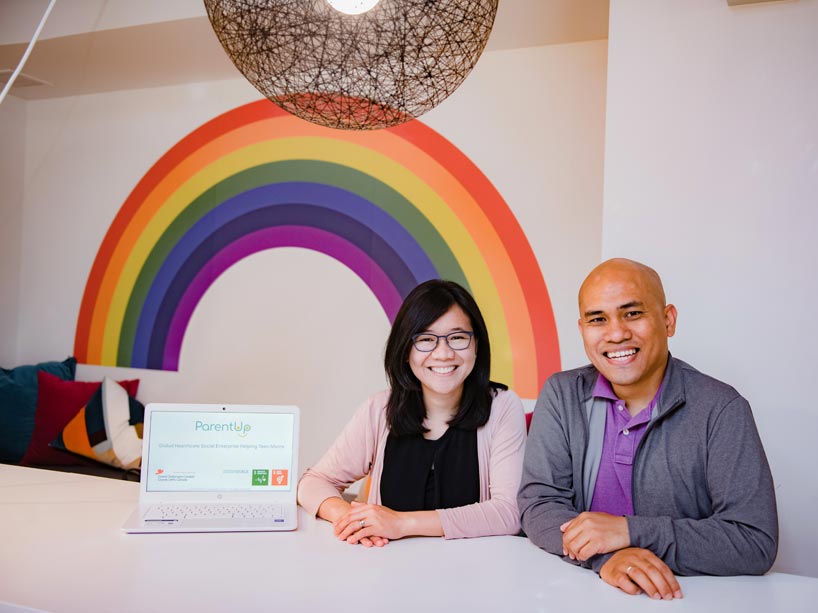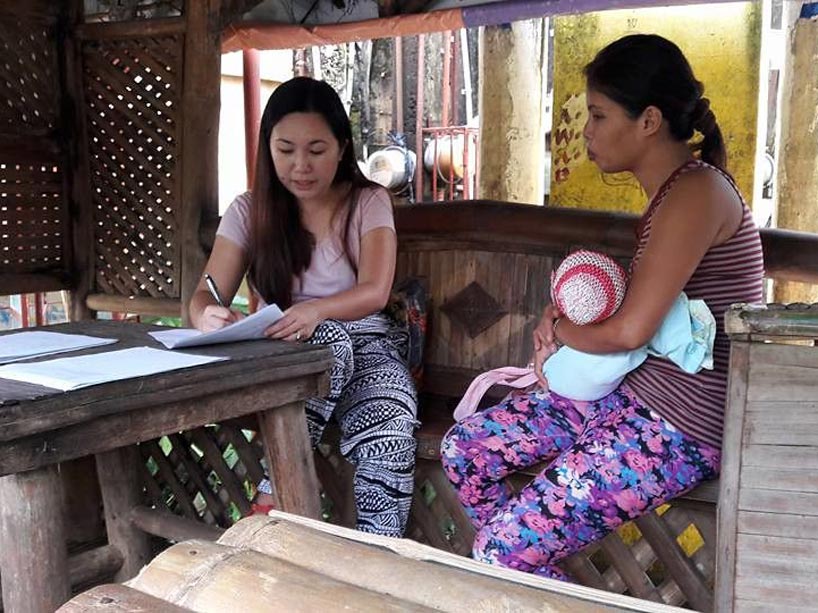Social startup provides parenting support for some of the world’s most vulnerable moms

Ryerson alumna Liza Ong and her husband Regnard Raquedan co-founded ParentUp, a social venture providing information and support to Filipino teen mothers. Photo credit: Alyssa Katherine Faoro.
Liza Ong and her husband Regnard Raquedan, co-founders of the Social Venture Zone-based startup ParentUp, turned their lived experience into a life-saving service for hundreds of young mothers a world away.
When their first child was born in 2013, Ong, a graduate of Ryerson’s master of data science and analytics program, and Raquedan, discovered how truly daunting parenthood can be. They were far away from family and community support back in the Philippines, and quickly realized how important those elements were for new parents.
Their experience inspired the couple to develop ParentUp, a technology-based service helping new teenage moms in the Philippines. It’s a toll-free service that provides relevant health information and non-judgmental emotional support. Users can simply text their questions and concerns from their mobile phones, and receive timely answers by trained experts.
“Originally we thought we were going to target low income moms in general,” says Ong. “However, as we went through the user research process, and interviewed around 150 moms in the Philippines, we realized the segments that needed the most help was teenage moms.”
Teenage pregnancy (children born to women aged 15 to 19) is about 10 times more prevalent in the Philippines than in Canada, and is increasing in rate. Recent data shows that, 203,085 (2016) annual births in the Philippines are to teenage mothers, which translates to nearly five percent of all annual births in the country. While many supports exist for new mothers in the Philippines, teenage mothers face unique barriers.
“We realized that in general, social support in communities was strong,” says Ong, “but then teenagers lose a lot of that social support. There’s disappointment from their family members. A lot of them leave school when they get pregnant, so they lose their friends. There’s a stigma attached to their pregnancy, so they lose support from their neighbours.”
Additionally, being legally underage, teenage expectant mothers can’t avail themselves of medical services unless parents accompany them. So many don’t visit doctors or clinics. For some of the poorest young women, even spending the equivalent of 10 cents to take the bus to a health center can be prohibitively expensive.

Liza Ong and her colleagues conducted 150 interviews with low-income Filipino teenage mothers in order to determine how best to structure support through ParentUp. Image courtesy of ParentUp.
However, they knew they could take the platform further, to support more moms. Ong’s data science and analytics program was invaluable when it came to building out the backend interface for ParentUp and provided guidance on how she can gather and protect data to better serve its users, while enabling her organization to scale. “I realized we can use machine learning to help us gain insights into conversations we were having with our moms and provide more automated answers to questions moms are asking,” said Ong.
In 2018 ParentUp was accepted into the Social Ventures Zone (SVZ) and received the annual Social Ventures Prize. This, along with funding through Grand Challenges Canada, enabled them to begin two pilots for ParentUp with 50 teenage mothers in two communities in the Philippines.
The response has been very encouraging; the women are very grateful for the support. Many of the mothers they support haven’t completed secondary education, and have questions about the most fundamental elements of childcare, asking questions like “How do I bathe my baby?” They’ve also requested information on other baby care basics like how to breastfeed, change diapers, etc. Ong and Raquedan recently learned that their service potentially saved a young woman’s life when she texted about symptoms she was experiencing. Her ParentUp nurse pressed her to visit a health clinic, where she was treated for severe bleeding due to a miscarriage.
ParentUp currently has five employees, and in July will begin a beta testing to a wider community in the Philippines. They also see opportunities for working more closely with local health authorities nationwide. To that end, Raquedan recently presented at the National Meeting of the Philippines' Commission on Population, positioning ParentUp as a viable program to help with population management. The organization is also part of the Zero Extreme Poverty 2030 Coalition, a civil service organization network that aims to eradicate extreme poverty in the Philippines.
In future, Ong and Raquedan hope to offer the service throughout the country, and beyond, but they are wary of growing too quickly. “We work in a very sensitive area,” says Ong. “We want to make sure we pay attention to (mothers’) needs as close as possible, even if that may not give us the fastest way to grow.”
In many ways, Raquedan and Ong’s approach to nurturing their fledgling company mirrors the situation of the many women they help: they only want what’s best for their baby.